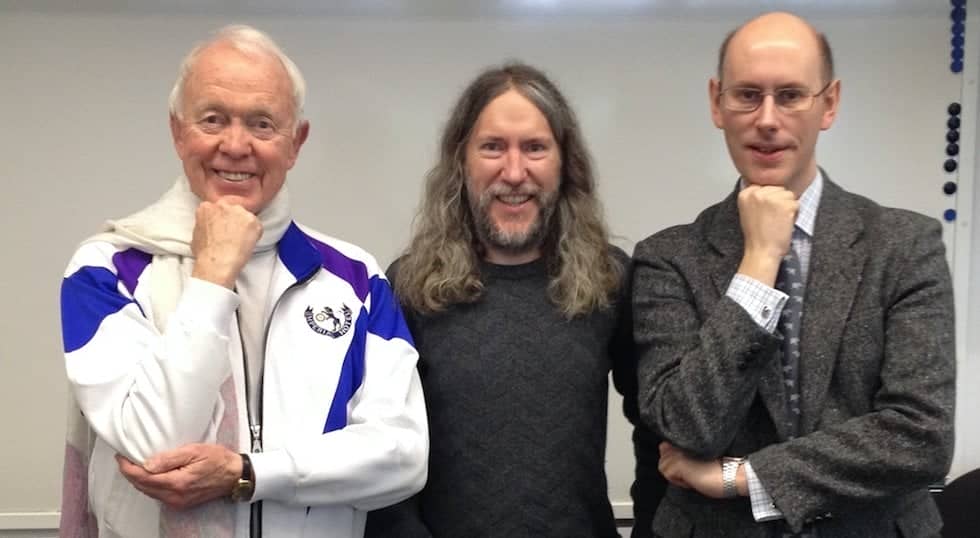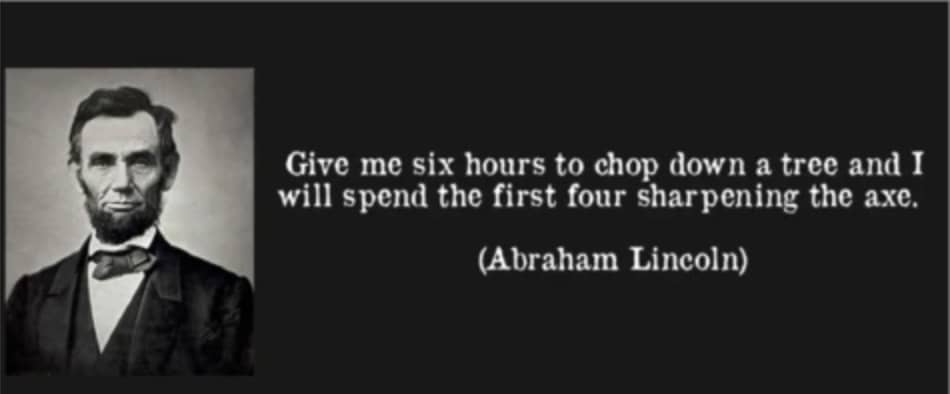Podcast: Download
Subscribe: Apple Podcasts | RSS
 If you want to solve life’s problems with greater ease, you should learn how to think logically, right?
If you want to solve life’s problems with greater ease, you should learn how to think logically, right?
Yes, but not so fast.
You want to make sure you’re using the right kinds of logic for the problems at hand.
For example, you might need a non-classical logic instead of classical logic to approach a particular problem.
You see, logical thinkers do what I’m doing now:
They put the brakes on when they encounter problems and start to spin those problems around.
Why? Because logic itself often involves digging deeper and analyzing different perspectives.
For example, one of the forms of logical thinking you’re about to discover would have you instantly ask…
Is there more than one kind of logic for solving life’s problems quickly? Or can I explore alternatives outside of logic?
A logical thinker might do the same thing to the very idea of a “problem” itself.
This is done by “mentally rotating” the topic at hand and seeing how it might in fact not be a problem at all.
It might be a path to a solution.
How to Think Logically: 9 Ways to Improve Your Logical Thinking Skills
At the end of the day, using the right form of logic is more about the best possible solution than the problem, but we do need to make sure we understand the problem first.
If you’ve listened to Elon Musk talk about first principles thinking, that’s a form of logic he’s using to help humans thrive on distant planets after earth dies. And communicate better here on our precious planet while we still can.
Those are real problems, and the right forms of logic are needed.
The best part?
There are a whole lot more ways to think logically to solve global and personal problems alike, so let’s get started
One: Take A Deep Dive Into Logical Thinking
Improving logical reasoning begins by knowing the types of logic at your disposal.
Exploring the history of logic is well worth your time because it will help you see how humans discovered these principles and refined them over time through practice.
As you’ll soon discover, many cultures have identified and used logical forms such as:
- Philosophical logic
- Informal logic
- Formal logic
- Modal logic
- Mathematical logic
- Paraconsistent logic
- Semantic logic
- Inferential logic
- Systematic logic
Related to this, you have the difference between what philosopher Elijah Millgram calls theoretical reasoning vs. practical reasoning. The first involves figuring out the facts, the second is the process of determining what courses of action to take based on what is ideally a set of accurate facts.
Now, usually what people who want to think more logically are actually after is the first category, or philosophical logic. This is also called “reasoning” and includes the skills of:
- Deduction
- Induction
- Causal inference
- Analogy
Deductive reasoning is what we think of when we think of Sherlock Holmes, who builds his cases by arguing from general principles. He uses these to describe a specific series of events and solve various mysteries.
Inductive reasoning is essentially the reverse of this process. Instead of using general principles to arrive at specifics, you use specific details to generalize. For example, you might notice that I post on this blog almost every week, and use inductive reasoning to logically determine that I am a consistent blogger.
Causal inference helps you understand the scientific reason why and how things change. For example, why are you reading this article? I can logically infer that it is because you want to experience change and become a better thinker.
(Or maybe you want to experience more, such as all of these 11 benefits of critical thinking.)
Analogy or analogical reasoning involves making comparisons based on established examples or models.
For example, we know that nearly every memory champion openly admits that they have normal memory that doesn’t work especially well without using mnemonic devices. By analogy, we can infer that any person with average memory abilities can become a memory champion.
How long should you study logic? I’d suggest at least 90 days so you can get the bird’s eye overview and enough of the granular details.

Plus, as you’ll soon discover on this page, there are other fields you can read from to improve your logical thinking.
Two: Understand the Problems You’re Trying to Solve Deeply
Ever taken a quiz and realized you answered before thinking about the question? You could have gotten it correctly, but your impulses took over and you lost precious points.
It’s not that you were being illogical. You just didn’t take the time to fully understand the question, and the reason why you failed to do so might have been logical. For example, from one perspective, in some contexts it might be perfectly logical to rush through an exam if you’re running out of time.
But generally, we want to be sure that we deeply understand the problems we face. That is why Abraham Lincoln famously said:
“Give me six hours to chop down a tree and I will spend the first four sharpening the axe.”
Lincoln is using an analogy here, one in which the “axe” stands in as an analogy. It speaks to spending the time needed to make sure you’re using the right tools for the job. Moreover, you make sure they are in top shape before you use them.
All the more reason to learn more about the different forms of logic. It will put more tools in your tool box and enable you to keep them sharp.
Here are 9 more critical thinking strategies to help you keep your axe sharp.
Three: Learn More About Language
A lot of people struggle to think logically because they don’t understand enough about what words mean.
Logical thinking involves nuance, so the more you know about words and their meanings, the greater mental precision in decision-making you’ll enjoy.
To improve, here’s how to memorize vocabulary. It will help you add more meanings to words and add more definitions to those you already know. Learning word origins and how prefixes and suffixes work will help you too.
On top of learning more about words and their meanings, learning about language and logic will help, such as studying syllogisms and logical fallacies.
Bonus tip:
Go deep and learn as much as you can about fallacies so you really know your stuff. It’s easy to fall into thinking traps if you don’t.
For example, some people like to accuse others of slippery slope fallacy, without realizing that there are actually six kinds of this fallacy.
If you want to think logically, it pays to be thorough. That’s why we’ll focus on thoroughness next.
Four: Read Quickly Without Sacrificing Thoroughness
Improving vocabulary is huge for improving logical thinking, and it will help you read faster.
But to improve your logical skills over time, you need to read thoroughly.
I suggest you read bigger books and more of them, starting with the key textbooks in your field of interest.
By going for the biggest and most authoritative books, you’ll be reading more logically.
Establishing foundations in your mind by reading authoritative textbooks will help you develop pattern recognition. This skill leads to faster use of the logical forms of inference we discussed in the first part of this article.
Five: Listen To Long Form Content

Not only is it helpful to read longer books, but you’ll learn to think much more logically when you listen to logical people think out loud.
Debates are a great way to do this and the Internet makes it possible to find many of them.
It’s important to pay attention to both sides of the argument, however.
As you listen, practice thinking yourself by mentally rehearsing the evidence you would provide in support of your views. Also think about how you would respond.
Another tip:
Notice the holes in the arguments proposed by the debaters and list out the ways you would fill in the gaps.
And if you want to remember more of what goes on during debates, Memory Palace Mastery is here to help.
Six: Expand Your Competence Using Multiple Media
I’ve just suggested that you experience “thinking out loud” and model it yourself.
But you’ll want to go beyond completing logical exercises in your mind. You should also:
- Speak
- Write
- Analyze
To practice speaking logically, engage in as many discussions as you can about real problems. Sure, there’s a place for talking about movies and sports. But if you want to know how to think more logically, you’ve got to practice it yourself in real time.
Writing is always key for developing logical thinking, so I suggest you keep a journal. This simple practice will help you see your own thinking process and improve it over time.
Combined, you will have many opportunities for self-analysis. If you can record your conversations and look at transcripts of them, all the better.
Seven: Ask Better Questions
A lot of us ask the typical W5 questions and let it rest at that:
- Who
- What
- Where
- When
- Why
- How
But to practice thinking logically, you want to go beyond these questions. Ask in addition to these questions:
- According to whom?
- According to what precedent?
- Where isn’t this true?
- When hasn’t this been the case?
- Why now?
There are many variations on these questions you can ask, and I cover more along these lines in our community’s post on how to think faster.
Eight: Learn Game Theory
One of the lesser known ways to learn logical thinking is to study games and metagames.
In brief, game theory studies areas of competition where people regularly make decisions. These decisions are influenced by other people in the area and in turn influence others.
By modeling the ways people interact in competitive contexts, you can learn to think more logically and avoid cognitive biases that harm your performance in life.
You’ll enjoy avoiding many problems because game theory helps train your mind to anticipate the possible outcomes of various decisions. By thinking through consequences in advance, you save yourself a lot of trouble.
Note: You can perform game theory on the past as well by thinking through what would have happened had people acted differently. This philosophical approach is called working through the counterfactuals of a historical situation and can be used on your personal life and large groups.
Some people think that game theory has limited value for everyday life, but I don’t think they’re being… logical about that. We all find ourselves in situations where we are influenced to act in certain ways and understanding these pressures will help you respond in much better ways.
A key example is by using the Monty Hall Problem or Three Door Problem to make decisions.

Some people squabble over whether it is in fact logical to use this problem in life, but I can attest to its value.
For example, when I see an opportunity to do something different and feel like I want to default to my previous choices, I bring this game theoretical example to mind and remind myself to travel the “path less travelled.”
Is the math on my side?
I think so, because I’ve gone on many adventures that logic dictates could not have happened had I chosen to stick with the same thing.
To learn more about these situations, check out the stories I share in The Victorious Mind: How to Master Memory, Meditation and Mental Well-Being.
Nine: Use Rules And Embrace Limitations
I didn’t use to like rules. In some ways I still don’t.
But one day I was enjoying dinner with Tony Buzan, memory expert, mind map innovator and co-founder of the World Memory Championships.
I told him about how I sometimes would switch memory systems while under time trials for numbers and playing cards.
He said, “The rules will set you free.”

This is important because life, as in memory training, often gives us the opportunity to use multiple techniques.
For example, when remembering numbers, we could choose the Dominic System or the Major System, though as I discovered, it doesn’t pay off to switch from one to the other during a time trial.
But by willing to limit ourselves and stick to the “rules” of just one system, we can improve our performance.
This is true in life too, where you can learn certain rules of thumb and stick to them.
To take another example, learning the logic of Chip and Dan Heath’s W.R.A.P. technique and practicing it over time has been a tremendously helpful problem solving model for me. In fact, it’s probably the approach that has improved my critical thinking the fastest.
In fact, it’s so helpful, it is “illogical” to forget not to use it when making decisions. That’s why I memorized it using a special memory technique called ars combinatoria, something that was very important in the history of how logical thinking developed.
What rules of thumb that help you “limit” yourself to a productive form of thinking and decision making can you adopt?
Thinking Logically Is A Rewarding Process To Enjoy For Life
Have you enjoyed learning these nine ways to improve your logical thinking?
I hope so and hope you will make practicing some of these approaches a personal hobby.

As a final tip, it would only be logical for me to recommend the opposite of logic.
You see, there are practices like Zen which evolved to help us see and experience the limits of logic. Zen turns language against itself to help us experience mental relief from the problems we think so hard about.
One of the best critical thinking books that situates the topic in the larger realm of computational thinking for both humans and machines is Gödel Escher Bach. For a collection of koans to explore, The Gateless Gate by Mumon is an interesting source.
I mention the opposite of logic not only because it is logical to do so. To fully experience the rewards of logical thinking, you need to be able to step outside of thinking altogether.
Questioning deeply is not enough. We need to question the process of questioning itself as a lifelong learning habit.
So on that note, let the questioning begin. Let me know which of these ways to improve your thinking you’re going to try out and what questions about logic do you still have?
Related Posts
- Independent Thinking: 7 Tips On Becoming An Individual Thinker
Developing independent thinking doesn't have to be a hard task. These tips reveal how easily…
- 7 Critical Thinking Examples That Will “Bulletproof” Your Mind
Real life critical thinking examples are hard to come by. This post gives you 7…
- 5 Critical Thinking Quotes That Will Instantly Sharpen Your Mind
Most critical thinking quotes have nothing to do with the critical part. These 5 quotes…
- 9 Deadly Critical Thinking Barriers (And How to Eliminate Them)
Most barriers to critical to critical thinking are easily removed. Read this post to boost…










